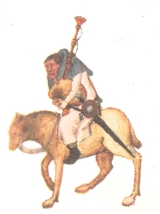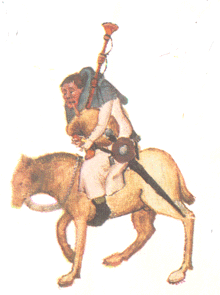
The Miller's Prologue and Tale
Encyclopedia

Geoffrey Chaucer
Geoffrey Chaucer , known as the Father of English literature, is widely considered the greatest English poet of the Middle Ages and was the first poet to have been buried in Poet's Corner of Westminster Abbey...
's Canterbury Tales
The Canterbury Tales
The Canterbury Tales is a collection of stories written in Middle English by Geoffrey Chaucer at the end of the 14th century. The tales are told as part of a story-telling contest by a group of pilgrims as they travel together on a journey from Southwark to the shrine of Saint Thomas Becket at...
(1380s-1390s), told by the drunken miller
Miller
A miller usually refers to a person who operates a mill, a machine to grind a cereal crop to make flour. Milling is among the oldest of human occupations. "Miller", "Milne" and other variants are common surnames, as are their equivalents in other languages around the world...
Robyn to "quite" (requite) "The Knight's Tale
The Knight's Tale
"The Knight's Tale" is the first tale from Geoffrey Chaucer's The Canterbury Tales. The story introduces many typical aspects of knighthood such as courtly love and ethical dilemmas. The story is written in iambic pentameter end-rhymed couplets.-Story:...
".
The Miller's Prologue is the first "quite" that occurs in the tales (to "quite" someone is to make repayment for a service, the service here being the telling of stories).
Prologue
The general prologue to The Canterbury TalesThe Canterbury Tales
The Canterbury Tales is a collection of stories written in Middle English by Geoffrey Chaucer at the end of the 14th century. The tales are told as part of a story-telling contest by a group of pilgrims as they travel together on a journey from Southwark to the shrine of Saint Thomas Becket at...
describes the Miller
Miller
A miller usually refers to a person who operates a mill, a machine to grind a cereal crop to make flour. Milling is among the oldest of human occupations. "Miller", "Milne" and other variants are common surnames, as are their equivalents in other languages around the world...
, Robyn, as a stout and pugnacious churl
Churl
A churl , in its earliest Old English meaning, was simply "a man", but the word soon came to mean "a non-servile peasant", still spelt ċeorl, and denoting the lowest rank of freemen...
fond of wrestling
Wrestling
Wrestling is a form of grappling type techniques such as clinch fighting, throws and takedowns, joint locks, pins and other grappling holds. A wrestling bout is a physical competition, between two competitors or sparring partners, who attempt to gain and maintain a superior position...
. In the Miller's Prologue, the pilgrims have just heard and enjoyed "The Knight's Tale
The Knight's Tale
"The Knight's Tale" is the first tale from Geoffrey Chaucer's The Canterbury Tales. The story introduces many typical aspects of knighthood such as courtly love and ethical dilemmas. The story is written in iambic pentameter end-rhymed couplets.-Story:...
", a classical story of courtly love
Courtly love
Courtly love was a medieval European conception of nobly and chivalrously expressing love and admiration. Generally, courtly love was secret and between members of the nobility. It was also generally not practiced between husband and wife....
, and the host Harry Bailey asks the Monk to "quite" ("follow" or "repay") with a tale of his own. However, the Miller insists on going next. He claims that his tale is "noble", but reminds the other pilgrims that he is quite drunk and cannot be held accountable for what he says. He explains that his story is about a carpenter
Carpenter
A carpenter is a skilled craftsperson who works with timber to construct, install and maintain buildings, furniture, and other objects. The work, known as carpentry, may involve manual labor and work outdoors....
and his wife, and how a clerk "hath set the wrightes cappe" (that is, fooled the carpenter). Osewold the Reeve
Reeve (England)
Originally in Anglo-Saxon England the reeve was a senior official with local responsibilities under the Crown e.g. as the chief magistrate of a town or district...
, who had originally been a carpenter himself, protests that the tale will insult carpenters and wives, but the Miller carries on anyway.
"The Miller's Tale" begins the trend in which succeeding tellers "quite" the previous one with their story. In a way the Miller requites the "Knight's Tale", and is himself directly requited with "The Reeve's Tale
The Reeve's Tale
"The Reeve's Tale" is the third story told in Geoffrey Chaucer's The Canterbury Tales. The reeve, named Oswald in the text, is the manager of a large estate who reaped incredible profits for his master and himself. He is described in the Tales as skinny and bad-tempered. The Reeve had once been...
", in which the Reeve follows Robyn's insulting story about a carpenter with his own tale disparaging a miller.
Synopsis
It is a vulgar, ribaldRibaldry
Ribaldry is humorous entertainment that ranges from bordering on indelicacy to gross indecency. It is also referred to as "bawdiness", "gaminess" or "bawdry"....
, and satirical fabliau
Fabliau
A fabliau is a comic, often anonymous tale written by jongleurs in northeast France between ca. 1150 and 1400. They are generally characterized by an excessiveness of sexual and scatological obscenity. Several of them were reworked by Giovanni Boccaccio for the Decamerone and by Geoffrey Chaucer...
in stark contrast to the courtly love of "The Knight's Tale."
"The Miller's Tale" is of an amorous student (Nicholas) who persuades his jealous landlord's much younger wife (Alison) to have sex with him. They plan a way to have sex by duping John, the landlord and a carpenter, through an elaborate scheme in which Nicholas convinces him that a flood of Biblical
Bible
The Bible refers to any one of the collections of the primary religious texts of Judaism and Christianity. There is no common version of the Bible, as the individual books , their contents and their order vary among denominations...
proportions is imminent. Their safety depends, says Nicholas, on waiting overnight in separate tubs suspended from the rafters, and to cut their tubs from the roof when the water has risen. He adds that if the landlord tells anyone else people will think he is mad (although he says this to make sure that no man tells the landlord to see sense in the matter). This comic prank allows Nicholas and Alison the opportunity to sneak down, after the landlord falls asleep, and have sex.
While Nicholas and Alison lie together, the foppish and fastidious parish clerk, Absalon, who is also deeply attracted to Alison and believes her husband to be away, appears kneeling at the bedchamber's low "shot-wyndowe" (privy vent) and asks Alison for a kiss. In the darkness, she presents her "hole" (bottom) at the window and he "kissed her naked arse full savorly". He realizes the prank and goes away enraged. He borrows a red hot coulter (a blade-like plough
Plough
The plough or plow is a tool used in farming for initial cultivation of soil in preparation for sowing seed or planting. It has been a basic instrument for most of recorded history, and represents one of the major advances in agriculture...
part) from the early-rising blacksmith. Returning, he asks for another kiss, intending to burn Alison. This time Nicholas, who had risen from bed to go to the privy, sticks his own backside out the window and breaks wind in Absalon's face. The enraged suitor thrusts the coulter "amidde the ers" (between the cheeks) burning Nicholas' "toute" (anus) and the skin "a hands-breadth round about". In agony, Nicholas cries for water, awakening John. Hearing someone screaming about water, he thinks that the Second Flood has come, panics, and cuts his tub loose, falling to the floor and breaking his arm. The rest of the town awakens to find him lying in the tub and in accordance with Nicholas' prophecy, he is considered a madman, and a cuckold
Cuckold
Cuckold is a historically derogatory term for a man who has an unfaithful wife. The word, which has been in recorded use since the 13th century, derives from the cuckoo bird, some varieties of which lay their eggs in other birds' nests...
too.
Religion
The Miller's Tale has religious commentary that may relate to corruption in the Catholic Church in 14thcentury Europe, and/or the dangers posed by lay heretics, although Geoffrey Chaucer
Geoffrey Chaucer
Geoffrey Chaucer , known as the Father of English literature, is widely considered the greatest English poet of the Middle Ages and was the first poet to have been buried in Poet's Corner of Westminster Abbey...
's religious views are not obvious.
On divination and misuse of Holy Scripture
Nicholas, a student, is relentlessly trying to sleep with his Lord’s wife, Alison. Nicholas is so desperate tosleep with her, he plans a clever trick on his lord that will allow him to do so. Nicholas tells his lord, John
the Carpenter, that a flood of Biblical proportions is imminent and the only way to save himself and his wife is to
suspend himself in a tub from the rafters:
"Now John," quod Nicholas, "I wol nat lye;
I have yfounde in myn astrologye,
As I have looked in the moone bright,
That now a Monday next, at quarter nyght,
Shal falle a reyn, and that so wilde and wood
That half so greet was nevere Noes flood.
This world," he seyde, "in lasse than an hour
Shal al be dreynt, so hidous is the shour.
Thus shal mankynde drenche, and lese hir lyf."
In a more modern translation, Nicholas essentially tells John that rain will consume the land, creating far more
devastation than Noah’s flood. In a desperate attempt to save his wife, Alison, John is willing to listen to
anything Nicholas says in order to save her from drowning. Nicholas is explaining to John that he has seen this
disaster because God came to him. As God saved Noah by forewarning him of the Flood, Nicholas assumes that role
with respect to John, dramatizing his predictions with astrological calculations and ecstatic contemplation of the
heavens. This, by implication, is the way the spiritual lords of the Church operate.
However Nicholaus is a layman in the tale, and the analogy may in fact be intended drawn in the opposite direction, i.e. that following the private teachings of individual heretics such as Nicholaus is dangerous.
Hypocrisy of the clergymen
Absalon is a parish clerk that is extremely vain and lives his life according to things that will better himself,rather than the church and the people. Absalon’s character is described as being neat in his appearance, with
fresh breath and curled hair. Absalon constantly tries to win over Alison by not only looking elegant, but also
giving her gifts, money, and kisses.
He kembeth his lokkes brode, and made hym gay;
He woweth hire by meenes and brocage,
And swoor he wolde been hir owene page;
He syngeth, brokkynge as a nyghtyngale;
He sente hire pyment, meeth, and spiced ale,
And wafres, pipyng hoot out of the gleede;
And, for she was of town, he profred meede;″
Absalon combs his flowing locks in an attempt to look elegant and will do and give anything to win over Alison.
The character Absalon represents the clergy during the fourteenth century because many clergy members were said to
be seen wearing fine ornaments, similar to a prince. Another factor that shows parallels between Absalon and the
actual clergy is the sexual, or attempted sexual relationships, among clergymen. Many clergymen broke their vows
of chastity, taking lovers, and even raising illegitimate children. Absalon may represent these kinds of church leaders, for he tries time and time again to be with Alison.

